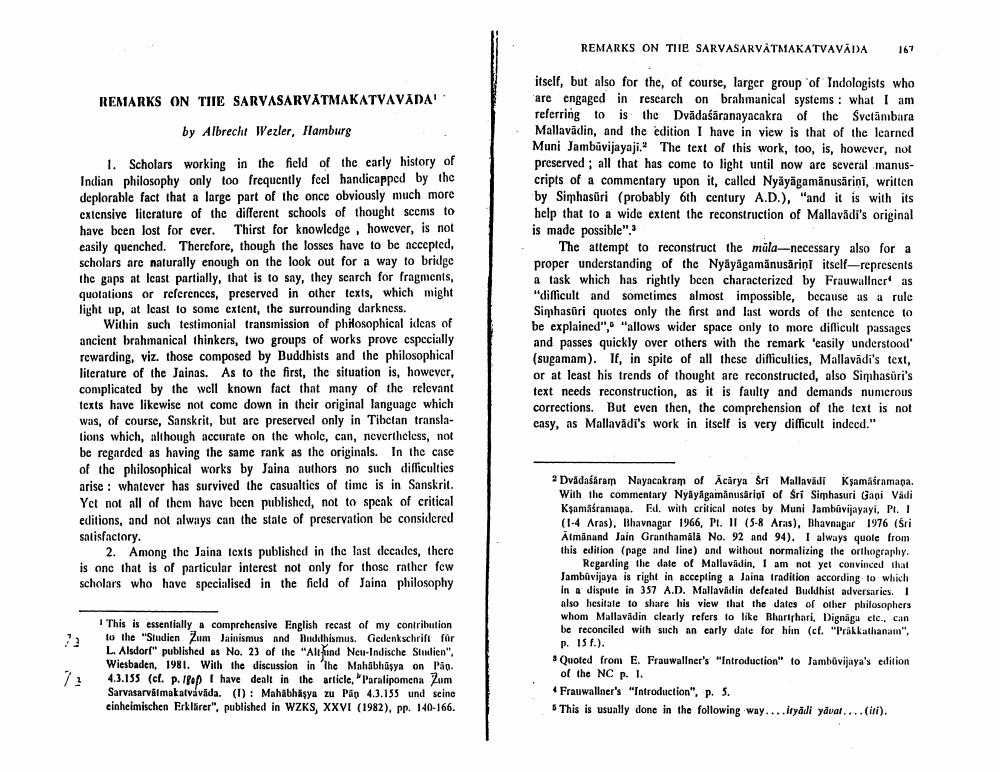Book Title: Remarks On Sarvasarvatmakatvavada Author(s): A Wezler Publisher: A Wezler View full book textPage 1
________________ REMARKS ON THE SARVASARVĀTMAKATVAVĀDA 167 REMARKS ON THE SARVASARVATMAKATVAVADA' by Albrecht Wezler, llamburg 1. Scholars working in the field of the early history of Indian philosophy only too frequently feel handicapped by the deplorable fact that a large part of the once obviously much more extensive literature of the different schools of thought scenis to have been lost for ever. Thirst for knowledge, however, is not easily quenched. Therefore, though the losses have to be accepted, scholars are naturally enough on the look out for a way to bridge the gaps at least partially, that is to say, they search for fragments, quotations or references, preserved in other texts, which might light up, at Icast to some extent, the surrounding darkness. Within such testimonial transmission of philosophical ideas of ancient brahmanical thinkers, two groups of works prove cspecially rewarding, viz. those composed by Buddhists and the philosophical literature of the Jainas. As to the first, the situation is, however, complicated by the well known fact that many of the relevant texts have likewise not come down in their original language which was, of course, Sanskrit, but are preserved only in Tibetan translations which, although accurate on the whole, can, nevertheless, not be regarded as having the same rank as the originals. In the case of the philosophical works by Jaina authors no such difficulties arise : whatever has survived the casualties of time is in Sanskrit. Yct not all of them have been published, not to speak of critical editions, and not always can the state of preservation be considered satisfactory. 2. Among the Jaina texts published in the last decades, there is one that is of particular interest not only for those rather few scholars who have specialised in the field of Jaina philosophy itself, but also for the, of course, larger group of Indologists who are engaged in research on brahmanical systems : what I am referring to is the Dvādaśaranayacakra of the Svetānbara Mallavadin, and the edition I have in view is that of the learned Muni Jambūvijayaji. The text of this work, too, is, however, not preserved; all that has come to light until now are several manuscripts of a commentary upon it, called Nyäyāgamanusarini, written by Simhasüri (probably 6th century A.D.), "and it is with its help that to a wide extent the reconstruction of Mallavādi's original is made possible". The attempt to reconstruct the mūla-necessary also for a proper understanding of the Nyayagamanusarini itself-represents a task which has rightly been characterized by Frauwallner as "difficult and sometimes almost impossible, because as a rule Simhasüri quotes only the first and last words of the sentence to be explained", "allows wider space only to more difficult passages and passes quickly over others with the remark 'easily understood (sugamam). If, in spite of all these difficulties, Mallavādi's text, or at least his trends of thought are reconstructed, also Sinhasüri's text needs reconstruction, as it is faulty and demands numerous corrections. But even then, the comprehension of the text is not casy, as Mallavādi's work in itself is very difficult indeed." 2 Dvadašaram Nayacakram of Acarya Sri Mallavidl Ksamásramapa. With the commentary Nyayagamanusáriol of Sri Simhasuri Gani Vadi Kşamásramaga. Ed. with critical notes by Muni Jambuvijayayi. Pl. I (1-4 Aras). Bhavnagar 1966, P. II (5-8 Aras), Bhavnagar 1976 (Sri Atmanand Jain Granthamälä No. 92 and 94). I always quote from this edition (page and line) and without normalizing the orthography. Regarding the date of Mallavadin, I am not yet convinced that Jambúvijaya is right in accepting a Jaina tradition according to which in a dispute in 357 A.D. Mallavkin deleated Buddhist adversaries. I also hesitate to share his view that the dates of other philosophers whom Mallavadin clearly refers to like Bhari hari, Dignaga etc., can be reconciled with such an carly date for him (cf. "Prakkathanam", p. 15 f.). Quoted from E. Frauwallner's "Introduction" to Jambúvijaya's edition of the NC p. I. Frauwaliner's "Introduction", p. s. * This is usually done in the following way....iryadi yaval.... (ini). 1 This is essentially comprehensive English recast of my contribution to the "Studien Zum Jainismus and Buddhismus. Gedenkschrift für L Alsdorf" published as No. 23 of the "Aland Neu-Indische Studien". Wiesbaden, 1981. With the discussion in "The Mahabhäsya on Pap. 4.3.155 (cl. p. IPop I have dealt in the article,"Paralipomena Zum Sarvasarvilmakatvávāda. (1): Mahabhasya zu Pan 4.3.155 und scine einheimischen Erklärer", published in WzKS, XXVI (1982). pp. 140-166. 72Page Navigation
1 2 3 4 5 6 7 8
